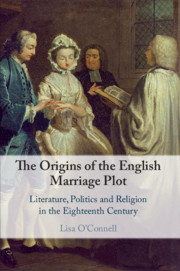 The Origins of the English Marriage Plot
The Origins of the English Marriage Plot Fielding, Shebbeare and Goldsmith
Published online by Cambridge University Press: 08 July 2019
The previous chapter showed that in mid-century England, where marriage loomed large as a political and moral topic, Richardson’s Anglican marriage plot elevated the novel form by figuring marriage as an institution joining the church and the state, and then by imagining characters like Pamela and Sir Charles Grandison who enact and embody that nexus. In the end, Richardson’s novels authorise their own imaginative – that is to say, literary – power by mediating between faith and citizenship (or better, by relaying faith into conjugality) inside the Erastian nation state.
It turns out, however, that the latent nation-buildingtendencies of Richardson’s marriage plots are more fully realised in a different programme: in a series of mid-century oppositional and satiric-sentimental novels that respond to Pamela. Of these, the most important are Fielding’s Joseph Andrews (1742), John Shebbeare’sThe Marriage Act (1754) and Oliver Goldsmith’s Vicar of Wakefield (1766).
To save this book to your Kindle, first ensure no-reply@cambridge.org is added to your Approved Personal Document E-mail List under your Personal Document Settings on the Manage Your Content and Devices page of your Amazon account. Then enter the ‘name’ part of your Kindle email address below. Find out more about saving to your Kindle.
Note you can select to save to either the @free.kindle.com or @kindle.com variations. ‘@free.kindle.com’ emails are free but can only be saved to your device when it is connected to wi-fi. ‘@kindle.com’ emails can be delivered even when you are not connected to wi-fi, but note that service fees apply.
Find out more about the Kindle Personal Document Service.
To save content items to your account, please confirm that you agree to abide by our usage policies. If this is the first time you use this feature, you will be asked to authorise Cambridge Core to connect with your account. Find out more about saving content to Dropbox.
To save content items to your account, please confirm that you agree to abide by our usage policies. If this is the first time you use this feature, you will be asked to authorise Cambridge Core to connect with your account. Find out more about saving content to Google Drive.